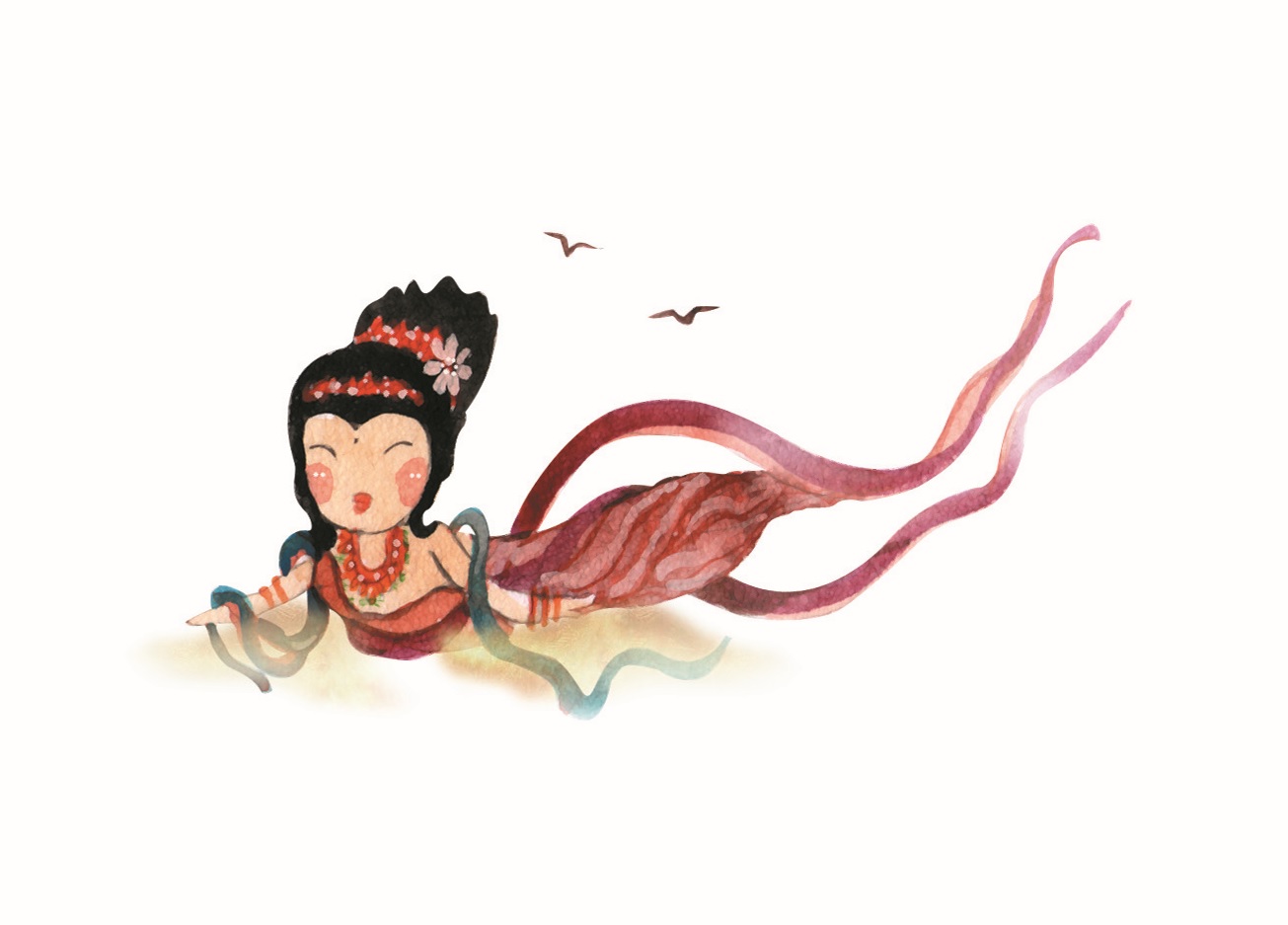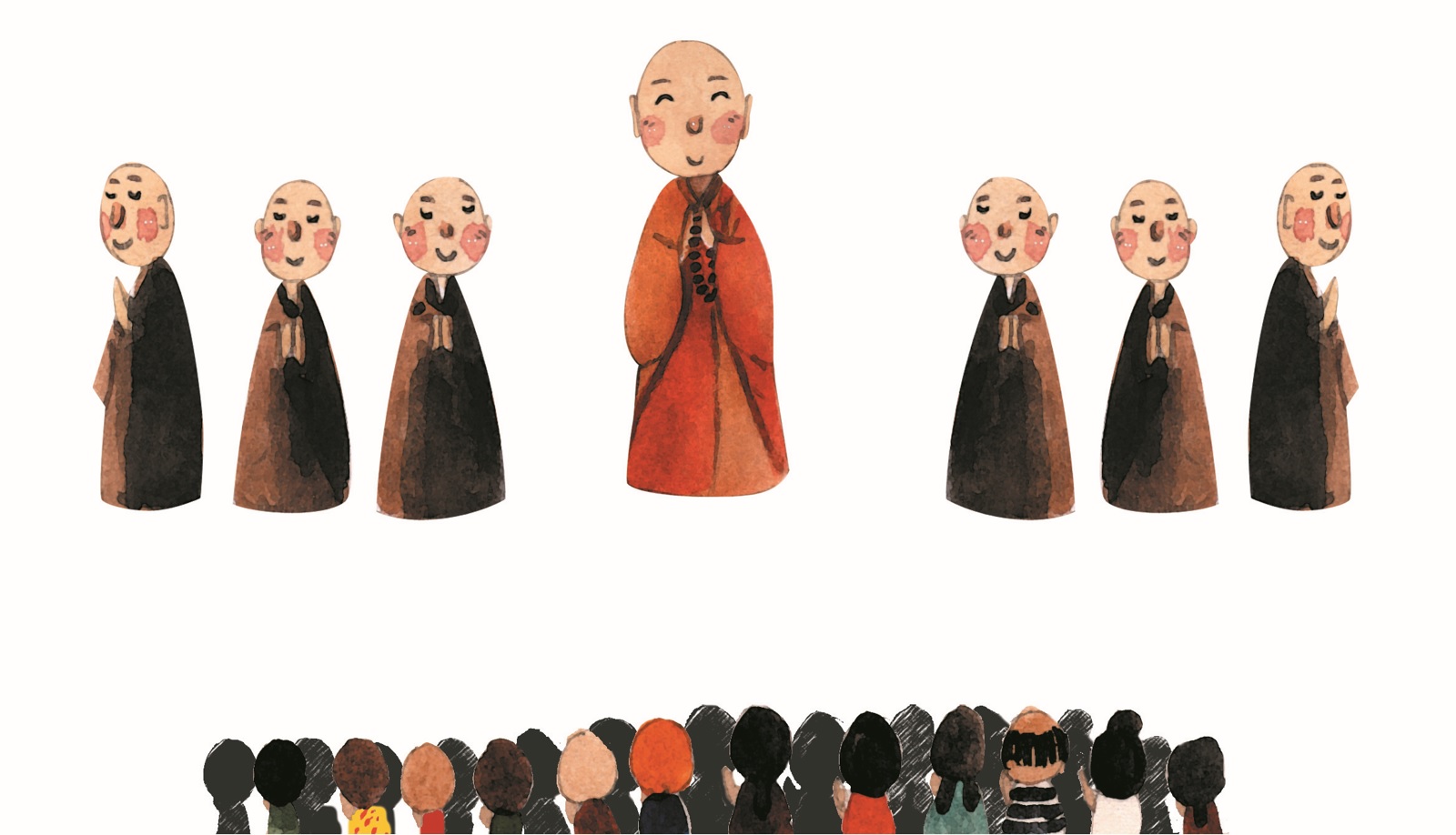Special Topics
Buddhist Stories on the Auspiciousness of Taking the Three Refuges
Taking Three Refuges saved Śakra from suffering in the animal realmŚakra, the heavenly king who resides in the Trāyastriṃśa Heaven, often led devas in battles with asurendras (lord of asuras). However, he later took refuge in the Three Jewels and engaged in Buddhist practices. How did this happen?
According to the Dharmapada Avadāna (《法句譬喻經》), during the Buddha's time, Śakra, the lord of the Devas, knew his life was about to end due to the exhaustion of his karmic rewards. Before his passing, he experienced five ominous signs: first, the light that normally emanated from his body gradually faded like an oil lamp going out; second, the flower on his head withered one by one; third, he became restless and could not stay calmly on his throne; fourth, stinking sweat began to come out of his armpits; and, fifth, dust and soil could stain his heavenly clothes.
 Realizing that his days were numbered and he was about to be reborn as a donkey, Śakra was terrified. He kept wondering who could rescue him from this dreadful fate, and realized that no one could save him except the Buddha. Therefore, before losing his divine power, he rushed to meet the Buddha, prostrated to him, and earnestly sought the Three Refuges—taking refuge in the Buddha, the Dharma, and the Sangha.
Realizing that his days were numbered and he was about to be reborn as a donkey, Śakra was terrified. He kept wondering who could rescue him from this dreadful fate, and realized that no one could save him except the Buddha. Therefore, before losing his divine power, he rushed to meet the Buddha, prostrated to him, and earnestly sought the Three Refuges—taking refuge in the Buddha, the Dharma, and the Sangha.However, as Śakra was about to make another prostration to the Buddha, his life came to an end, and his consciousness was immediately reincarnated in the womb of a donkey. The donkey accidentally stepped on the pottery of her owner, who then angrily whipped her, leading to the donkey's miscarriage. Meanwhile, Śakra's consciousness returned to himself.
At this moment, the Buddha praised Śakra, saying: "Well done! That is great! Śakra, you managed to take refuge in the Three Jewels before death, thus ending your karmic retribution of descending to the animal realm. You are very blessed, indeed." The Buddha then delivered a Dharma talk to Śakra, who instantly attained sotāpanna (the initial level of awakening).
King Pasenadi took Refuge and became a great upholder of the Dharma after proposing questions to the Buddha
King Pasenadi was the king of the Kosala Kingdom in the Budda's time. His queen, Mallikā, had already taken refuge in the Three Jewels and was a disciple of the Buddha. King Pasenadi often heard her speaking highly of the Buddha. In addition, he learned that Crown Prince Jeta had sold the park in Shravasti to Respected Elder Sudatta, who established a vihāra (Buddhist monastery) there as an offering to the Buddha, while King Pasenadi was not impressed by their decisions.
According to of Fascicle 46 of the Saṃyukta-āgama and the Discourse on Born From the Beloved–Discourse 216 of the Madhyama Āgama, King Pasenadi once led his officials to visit the Buddha at the Jetavana Vihāra. Upon seeing the Buddha, King Pasenadi bluntly asked: "I have heard that you are an awakened one attaining ultimate enlightenment. Nevertheless, many practitioners still cannot attain enlightenment before death at an old age despite their decades-long spiritual cultivation in remote mountains. Young as you are, how could you have possibly attained enlightenment? Besides, you are not a Brahmin."
 The Buddha replied: "Your Majesty! The youth are often scorned, which is not a good sign. There are four things in the world that should not be despised: first, a young prince; second, a newborn dragon; third, a tiny spark; fourth, a young monastic. This is because a young prince can become a lord ruling a country when he grows up; a little dragon might be small, but it can soon grow into a big one; tiny as a spark can be, it can turn into conflagrations flaming in forests and cities; as for monastics, regardless of their background and age, any one of them with a pure mind and the great aspiration to save sentient beings can attain enlightenment. Therefore, the karmic retribution for slighting or slandering an enlightened person is truly grave, which can only be eradicated through repentance."
The Buddha replied: "Your Majesty! The youth are often scorned, which is not a good sign. There are four things in the world that should not be despised: first, a young prince; second, a newborn dragon; third, a tiny spark; fourth, a young monastic. This is because a young prince can become a lord ruling a country when he grows up; a little dragon might be small, but it can soon grow into a big one; tiny as a spark can be, it can turn into conflagrations flaming in forests and cities; as for monastics, regardless of their background and age, any one of them with a pure mind and the great aspiration to save sentient beings can attain enlightenment. Therefore, the karmic retribution for slighting or slandering an enlightened person is truly grave, which can only be eradicated through repentance."Since no one had ever dared to speak frankly to him, King Pasenadi was astounded after hearing the Buddha's words. Ashamed, he asked the Buddha for the Dharma. The Buddha then expounded the Noble Eightfold Path to King Pasenadi, thereby breaking his inner ignorance. From then on, King Pasenadi had veneration for the Buddha, and praised the Buddha. Upon hearing King Pasenadi's praise of utmost sincerity, the Buddha knew the king had developed joy and firm faith in the Dharma. The Buddha then expounded the Three Seals of the Dharma (trilakṣaṇā dharmamudrā) to him. Towards the end of the Dharma talk, the Buddha reminded the king, "Your Majesty, please do not assume that spiritual cultivation cannot be developed without entering a monastic order as householders and renunciants can both engage in practice. Some people seek the Dharma in remote mountains but end up becoming decadent, while others are lay practitioners who gain blessings through deepening their spiritual cultivation. Thus, it is certainly possible for a king to engage in spiritual cultivation."
Convinced by every word the Buddha said, King Pasenadi then took refuge in the Three Jewels, and thus became a highly capable disciple of the Buddha and devoted upholder of the Dharma ever since.
Awaken and inspired by Master Zhiyi, Lord Guan became a sangharama
Sangharama are a class of Dharma-protecting deities guarding Buddhist temples and monasteries. Tradition has it that the Sangharama of Chinese Buddhism is Lord Guan (關公), the renowned Guan Yu of the Three Kingdoms period in Chinese history. In folklore belief, he is also worshipped as Holy Ruler Deity Guan. How did Lord Guan come to be the guardian deity of Chinese Buddhism? It is said to be related to Master Zhiyi (智者大師), the patriarch of the Tiantai tradition.
One day, while sitting in meditative concentration on Jade Spring Hill in Jingzhou, Master Zhiyi saw a headless general atop a white horse, wielding a giant glaive, shouting "Give me my head!" What prompted this unusual spectacle? It turned out that the general was Lord Guan, who had been framed and decapitated. Lord Guan had lived an honorable and upright life, but was plotted to death. He was so indignant that even his death could not stop him from seeking to retrieve his head.
While still in meditative concentration, Master Zhiyi challenged Lord Guan by asking him, "Who had chopped numerous heads in his lifetime, and who should be responsible for returning those heads back to their owners?" Upon hearing this, Lord Guan came to his senses, decided to take refuge in the Three Jewels under Master Zhiyi, and, moreover, vowed to uphold Buddhism as a Buddhist guardian deity. This is the story behind the well-known Sangharama in Chinese Buddhism.
Related articles:
Taking Refuge – The First Step to Firm Buddhist Practice
Overcoming the Eight Major Obstacles to Taking Refuge
Buddhist Stories on the Auspiciousness of Taking the Three Refuges
Taking Refuge: A Sincere Vow to Engage in Buddhist Practice
Common Questions on Taking Refuge
Refuge Taking Rituals of Different Buddhist Traditions
The Three Refuges Verse for Morning and Evening Services as a Reminder
Resource: Issue 373 of Humanity Magazine, Dharma Drum Publishing Corporation
Translation: Sinag-ling Li (李祥苓)
Editing: Keith Brown, Chia-Cheng Chang (張家誠)
